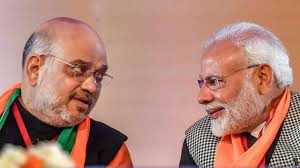
New Delhi. 06 August 2019. Indian Minister for Home Affairs, Amit Shah, introduced two bills and two resolutions regarding Jammu & Kashmir (J&K) in Lok Sabha today. These are as follows:
- Constitution (Application to Jammu & Kashmir) Order, 2019 {Ref. Article 370(1) of Constitution of India} – issued by President of India to supersede the 1954 order related to Article 370.
- Resolution for Repeal of Article 370 of the Constitution of India {Ref. Article 370 (3)}
- Jammu & Kashmir (Reorganisation) Bill, 2019 {Ref. Article 3 of Constitution of India}
- Jammu & Kashmir Reservation (2nd Amendment) Bill, 2019 {Home Minister withdrew the Bill from both Houses as the provisions of this act would become applicable to J&K once article 370 gets repealed and the laws of Union of India become applicable there}
Article 370(3) provides President of India the powers to amend or repeal the article by issuing a notification, based on a recommendation of Constituent Assembly of J&K. President of India signed the Constitution Order 2019 yesterday regarding Article 370(1), under which all the provision under article 4 would be applicable to J&K. J&K constituent assembly would be read as J&K Legislative Assembly. Similar changes to article 370 have been done in the past as well.Now since President’s rule is in force in the state, implementation of article 370 would cease to exist when President of India issues the notification in this regard, after this House passes the resolution.
Replying to the debate, Shah stated,”I want to state that J&K is an inalienable part of India. There are no two versions about that”.Parliament is the highest and fully competent body to make laws and bring resolutions regarding a state of India including J&K. There can be no question to this power of the Parliament. Shah said that for 70 years, people of India have harboured this aspiration in their hearts that Kashmir must be an integral part of India. Article 370 was the only roadblock to realize this goal. Home Minister thanked the Prime Minister for this historic step to remove this roadblock for ever.
Leader of Main Opposition Party in Lok Sabha raised the issue of how the Centre can take this step unilaterally when Kashmir is a bilateral issue between India and Pakistan and when the matter is pending in UN.
To this, Shah retaliated and challenged the opposition that they must clarify their stand on the floor of the House whether they support UN meditation in Kashmir.The opposition in a way has questioned the competence of the Parliament by raising this point, he stated.
Shah asked the members, “How can patriots of India who can sacrifice their lives for the country not get perturbed by such a question?”In India, things do not function on whims and fancies but on laws. I am always ready for constructive discussion but never for destructive debate, he added.
Speaking on the applicability of United Nations charter on India and Pakistan to J&K, Shri Shah said thatunder this charter, neither armed forces would violate the territorial integrity of other country. The day in 1965Pakistan violated this provision, the charter was violated. The question of a referendum ended with the Pakistani aggression. Hence, the Government of India has full rights to take any decision regarding its territorial integrity. This was even agreed to by the UN, Home Minister added.
Shah reminded the opposition and asked who took Kashmir matter to UN and who brought a unilateral cease fire in 1948? “Had our forces given a free hand to deal with the situation, PoK would have been a part of India today”, he stated.
Introducing the resolutions and bills on the floor of the House, Shah said that the House has been witness to many historical moments. Today once again this House is witness to a golden day when we are going to bring J&K truely into India’s fold.Now, local representatives would have a voice in the hill councils. The governments would be democratically elected and would run the local government and administration in J&K.
Several members have raised the apprehension about the period for which the Union Territory status will continue for J&K. Shah said that regarding Ladakh, it wasa long standing demand. Further he said, “I want to assure the people of J&K that the status of State would be restored once the situation normalises. Secondly, PoK and Aksai Chin are an inalienable part of JK and the seats are still part of the legislature.J&K would have a Legislative Assembly with elected representatives and it is a misnomer that the administration would be run by the Centre, he assured the House.
Home Minister explained the difference between articles 370 and 371. Article 370 was originally a temporary provision. He informed that because of article 370, the laws of Union of India did not apply to J&K, corruption and terrorism flourished there. Article 371 relates to special provisions to special clauses favouring development to backward regions in some states. Why would the Government repeal article 371 and why is the opposition equating articles 370 and 371, he asked. Home Minister assured the people of these states that this Government has no intention of repealing article 371.Further, Shah also classified that Naga Accord and article 370 have no relation and no mistake committed in the past would not be repeated by this Government.
Regarding troop deployment and no internet facilities in J&K currently, Shri Shah assured that there is no reason other than preventing some nefarious elements from instigating violence in the State and no one can stop the government to take precautionary measures to protect the peace inside the country. He made it clear that the government would never talk with separatist elements and those who back cross border terrorism. The government would only talk with anyone once they are committed for peace and development in J&K.
Taking on the opposition about the division of erstwhile state of Andhra Pradesh, the Home Minister said that the proposal was rejected by the State Assembly by two-thirds majority. Even then the earlier Government went ahead with the division without consulting all political parties.
Removing article 370 has no communal agenda as a number of communities and religious groups are resident of J&K that are affected equally. Article 370 has perpetuated discrimination against the minorities including Sikhs, Buddhists admin others. Further, Shah said, in the past 70 years over 41500 people have been killed. Should we continue on the same path and let people die. Who is responsible for this state of affairs? Are not the youth of J&K and Ladakh require development. For how long would we deprive them only for vote bank politics. Repealing article 370 is not a historic blunder, rather it is historic step to correct this historic blunder. Such bold steps are not taken for vote bank but for the betterment of people of J&K and for three Nation, Home Minister stated.
Shah further said that those who favour Article 370 are in opposition to the Prevention of Child Marriage Act which could not be applied to J&K due to Article 370. Similarly other laws like Right to Education, Land Accusation Act, Multiple Disability Act, Senior Citizens act, Delimitation act, Whistle Blower Protection act, laws enacted for empowerment of tribals, National Commission for Minorities, National Council for Teacher Education, among others, could not be applied to J&K.
How is this in favour of the people of JK to not apply these laws in the state, Home Minister asked the House. The reason, he said, is simply that after President’s rule was applied in J&K, all corruption cases were opened and those who were at the receiving end are opposing the repealing of article 370. Democracy was strangulated by the use of article 370 for 70 years. Today, after this government came to power, over 40000 panch and sarpanches are taking the democratic process forward and development has started.
Taking on the cross border terrorism, Shah stated that Pakistan has misused the presence of article 370 to sow the seeds of separatism and terrorism in J&K. I appeal to all those who favour article 370, to ponder what benefits did the provision bring to the state. It only prevented development and facilitated terrorism there. Only by repealing this provision, we can bring the people to the mainstream and embrace them with open arms.J&K is the heaven on earth and I assure everyone that it would continue to remain so when all the laws of Union of India become applicable to the state, he said.
The Home Minister appealed to the House to once again ponder on all these points and join hands with the Government to bring the people of J&K in the mainstream of development.



























































































































